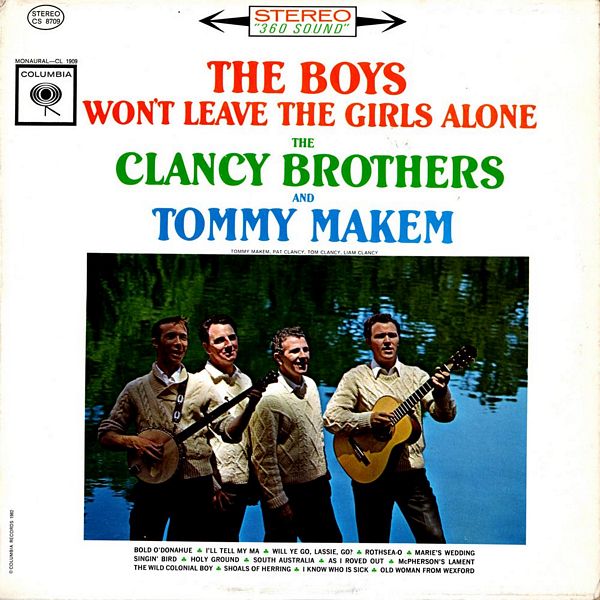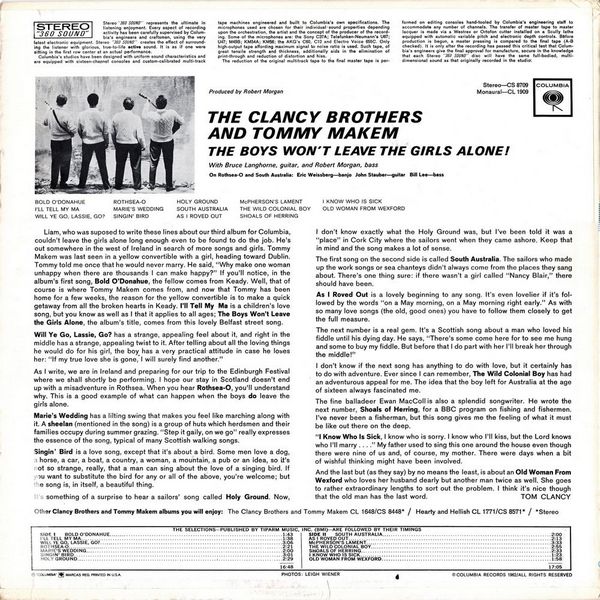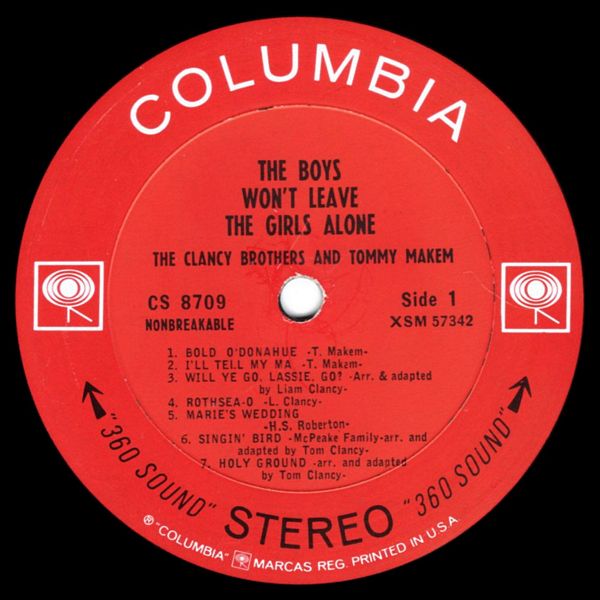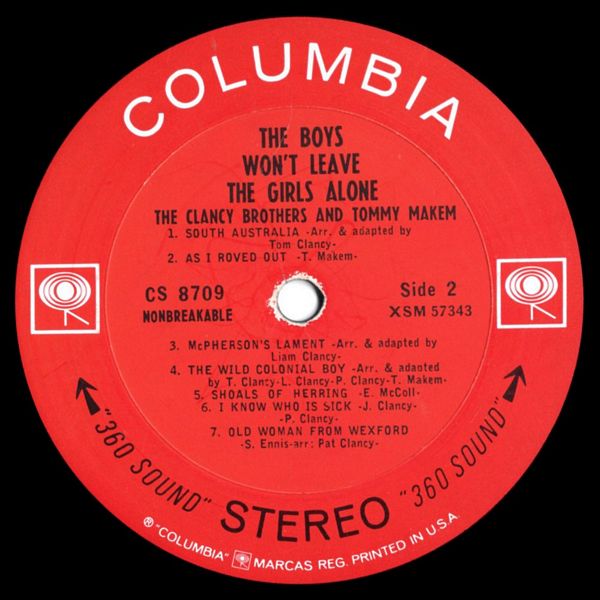

 |


 |
Sleeve Notes
Liam, who was supposed to write these lines about this album couldn't leave the girls, alone long enough even to be found to do the job. He's out somewhere in the west of Ireland in search of more songs and girls. Tommy Makem was last seen in a yellow convertible with a girl, heading toward Dublin. Tommy told me once that he would never marry. He said, "Why make one woman unhappy when there are thousands I can make happy?" If you'll notice, in the album's first song, Bold O'Donahue, the fellow comes from Keady. Well, that of course is where Tommy Makem comes from, and now that Tommy has been home for a few weeks, the reason for the yellow convertible is to make a quick getaway from all the broken hearts in Keady. I'll Tell My Ma is a children's love song, but you know as well as I that it applies to all ages; The Boys Won't Leave the Girls Alone, the album's title, comes from this lovely Belfast street song.
Will Ye Go, Lassie, Go? has a strange, appealing feel about it, and right in the middle has a strange, appealing twist to it. After telling about all the loving things he would do for his girl, the boy has a very practical attitude in case he loses her: "If my true love she is gone, I will surely find another."
As I write, we are in Ireland and preparing for our trip to the Edinburgh Festival where we shall shortly be performing. I hope our stay in Scotland doesn't end up with a misadventure in Rothsea. When you hear Rothsea-O, you'll understand why. This is a good example of what can happen when the boys do leave the girls alone.
Marie's Wedding has a lilting swing that makes you feel like marching along with it. A sheelan (mentioned in the song) is a group of huts which herdsmen and their families occupy during summer grazing. "Step it gaily, on we go" really expresses the essence of the song, typical of many Scottish walking songs.
Singin' Bird is a love song, except that it's about a bird. Some men love a dog, a horse, a car, a boat, a country, a woman, a mountain, a pub or an idea, so it's not so strange, really, that a man can sing about the love of a singing bird, If you want to substitute the bird for any or all of the above, you're welcome; but the song is, in itself, a beautiful thing. It's something of a surprise to hear a sailor's song called Holy Ground. Now, I don't know exactly what the Holy Ground was, but I've been told it was a "place" in Cork City where the sailors went when they came ashore. Keep that in mind and the song makes a lot of sense.
The first song on the second side is called South Australia. The sailors who made up the work songs or sea chanteys didn't always come from the places they sang about. There's one thing sure: if there wasn't a girl called "Nancy Blair," there should have been.
As I Roved Out is a lovely beginning to any song. It's even lovelier if it's followed by the words "on a May morning, on a May morning right early." As with so many love songs (the old, good ones) you have to follow them closely to get the full measure.
The next number is a real gem. It's a Scottish song about a man who loved his fiddle until his dying day. He says, "There's some come here for to see me hung and some to buy my fiddle. But before that I do part with her I'll break her through the middle!"
I don't know if the next song has anything to do with love, but it certainly has to do with adventure. Ever since I can remember, The Wild Colonial Boy has had an adventurous appeal for me. The idea that the boy left for Australia at the age of sixteen always fascinated me.
The fine balladeer Ewan MacColl is also a splendid songwriter. He wrote the next number, Shoals of Herring for a BBC programme on fishing and fishermen. I've never been a fisherman, but this song gives me the feeling of what it must be like out there on the deep.
"I Know Who Is Sick, I know who is sorry. I know who I'll kiss, but the Lord knows who I'll marry . . ." My father used to sing this one around the house even though there were nine of us and, of course, my mother. There were days when a bit of wishful thinking might have been involved.
And the last but (as they say) by no means the least, is about an Old Woman From Wexford who loves her husband dearly but another man twice as well. She goes to rather extraordinary lengths to sort out the problem. I think it's nice though that the old man has the last word.
TOM CLANCY